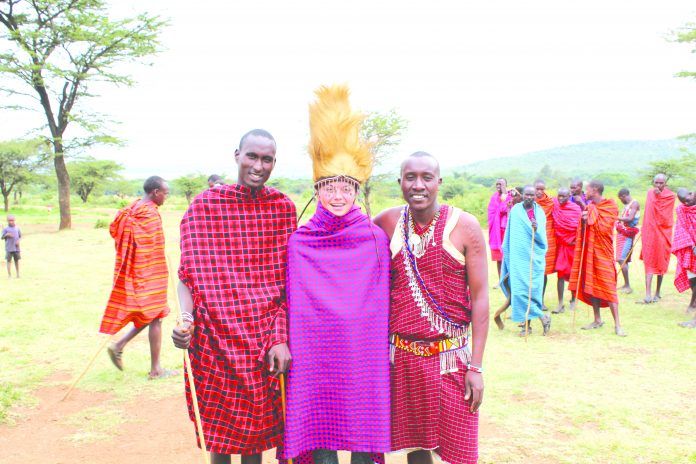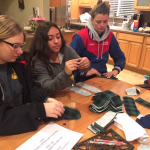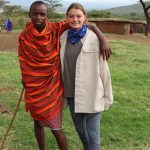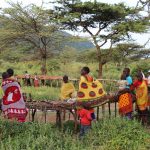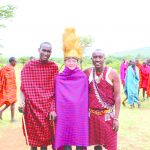Los Alamitos teen creates nonprofit for African girls
By David N. Young
It’s a world away, yet a Los Alamitos High School senior has taken a bond of gratitude out of Africa into her very own heart.
Although the remote African country of Kenya is nearly 10,000 miles from relatively small city of Los Alamitos, the inspiration of Jessica (Jessie) Ridgeway shows how quickly the yearning of human hearts can overcome any measure of distance.
“I want to make a difference,” said seventeen-year-old Ridgeway. Following a visit to Africa in 2016, she was inspired to find a way to help the girls she met. After a long process, Ridgeway has finally received her IRS approval to form a 501c3 nonprofit organization, which she has entitled “African Sisterhood.”
Armed with government approval, Ridgeway, supported by her parents, friends and volunteers are now preparing to sew their way into the lives of hundreds of young African women.
Kenya is an amazing place. Sweeping savannahs. Monstrous craters. Incredible views of wildlife, nature and is very near the “cradle of civilization.”
Yet for all its beauty, history and majesty, there remain significant challenges to young women living there, claims Ridgeway.
While visiting there with her parents, Ridgeway was moved not only by the scenery and the safari, but was struck by what she discovered visiting local orphanages and tribal villages of the Maasai tribe in the remote Kenyan countryside.
“I learned of a very common challenge that girls in Kenya face,” said Ridgeway. “About 36% of school aged girls drop out of school due to missing too many days while on their menstrual cycle. When provided with feminine hygiene products, the drop out rate is reduced to only 8%,” she added.
According to Ridgeway, the goal of her nonprofit “is to empower girls and women in Kenya by helping them with basic needs starting with providing them feminine hygiene products.”
After undertaking the challenge of forming the “African Sisterhood” nonprofit, Ridgeway has accepted the challenge to supply teen girls in Kenya with reusable feminine hygiene pads.
Ridgeway said she met with so many girls that told her that not having the ability to attend school because of simple menstrual cycles caused them to miss class and, in some cases, drop out.
One problem, though, in that Ridgeway had no idea how to make feminine hygiene products.
“I did some research,” she said, and later traveled to Utah to meet with women already doing the same thing. Slowly, she began to understand how to make feminine napkins out of cotton and flannel.
Ridgeway even spoke to engineers and with the help of friends and family, sewed a prototype, which she now demonstrates to a growing army of volunteers who want to help.
“It’s crazy,” said Ridgeway, whose heart was touched by the teenaged African girls she met. “They have very little but are so happy; so grateful for the tiniest things,” she said. Whether or not it is the contagious humility or the tremendous need, Ridgeway’s African trip apparently changed her life, inside and out.
Even before her Africa trip, Ridgeway was already an experienced traveler, having seen poverty in South America and other places. Her parents, William and Tricia, have for a long time taken their children with them on travels around the world.
Her dad is a Long Beach veterinarian and her mom is involved in business, including her own efforts to make life easier for African villages.
Ridgeway said she came up with the name of African Sisterhood after one of the girls in the orphanage “asked to be my sister.” While visiting with girls in the village and the orphanage, she learned that while the government does make feminine napkins available, the stores in some cases are hundreds of miles from the girls, who already have to walk three hours per day just to get dirty water to drink.
Ridgeway hopes to assemble 300 “girl kits” that she plans to personally deliver this summer when she and her family go back to Africa. Each kit will contain a bar of soap, a washcloth, 3 or 4 feminine napkins, underwear and a zip lock bag for washing.
With her nonprofit now official, Ridgeway has organized her first “sew-in” this Saturday, January 26, at the Sea Base, 5876 Appian Way in Long Beach. She could use dark colored 100 percent cotton washcloths (dark colors please), sewing machines and volunteers who know how to use them.
“Jessie has a big heart,” said her mom Tricia, who is working with Jessie to launch African Sisterhood. Jessie’s mom said she and her husband have taken their children, Jessica and Josh, to many parts of the world and they are very supportive of their daughter’s philanthropic ambition.
Ridgeway’s story is one of a caring American family, unafraid of embracing cultures a world away and then, in their own way, making a small difference in the lives of less fortunate young women they discovered along the way.
For Jessie Ridgeway, the aura of happiness is now out of Africa and into her heart, with the connection only expected to grow in the years ahead.
Editors Note: For readers who want to donate, bring a sewing machine or volunteer for the “sew-in this Saturday,” email the Ridgeways at africansisterhood@aol.com or visit www.africansisterhood.org.

